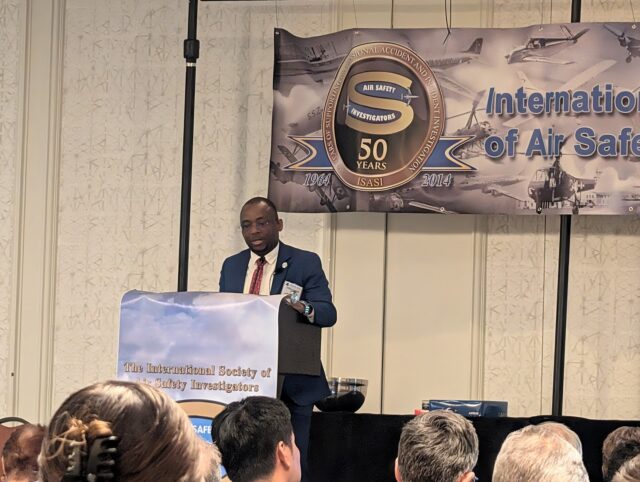
Commissioner of the Banjul Accord Group Accident Investigation Agency (BAGAIA), Engineer Charles Irikefe Erhueh, has shared vital insights on delegated accident investigation, stressing cooperation, cultural sensitivity, and professionalism.
He spoke during the International Society of Air Safety Investigators (ISASI) 2025 conference in Denver, Colorado, on October 2, presenting a paper titled Delegated Accident Investigation by São Tomé to BAGAIA and the Lessons Learned.
He explained that under ICAO Annex 13, a State of Occurrence may delegate an investigation to another State or to a Regional Accident Investigation Organization (RAIO).
This is intended to guarantee independence and efficiency, especially when the State of Occurrence lacks resources or expertise to conduct a credible inquiry. Delegated accident investigation, he said, remains a proven tool for strengthening global air safety.

The case study focused on the 2017 CAVOK Airlines AN-74TK-100 crash in São Tomé. Flight CVK 7087, registered UR-CKC, went down on July 29, 2017, during take-off from São Tomé International Airport. Recognizing its limited capacity, the São Toméan aviation authority formally asked BAGAIA to assume responsibility.
BAGAIA then coordinated with the Nigerian Safety Investigation Bureau (NSIB) then AIB Nigeria, Ukraine’s Bureau for Aviation Occurrences, and São Tomé’s Instituto Nacional de Aviação Civil (INAC), ensuring a multinational response.
This cooperation became one of the first demonstrations of BAGAIA’s regional role under ICAO Doc. 9946.
Despite strong collaboration, investigators faced translation delays, scheduling conflicts, and limited on-site time. The final report concluded the crash was caused by a rejected take-off above decision speed (V1) due to birds on the runway, a decision inconsistent with CAVOK Airlines’ Standard Operating Procedures.
The inquiry produced 23 findings and nine safety recommendations: six to São Tomé’s regulator, two to CAVOK Airlines, and one to Ukraine’s Civil Aviation Authority. These covered runway wildlife management, operational standards, and oversight measures.
Engineer Erhueh emphasized that patience, teamwork, and cultural respect were key lessons from the São Tomé case. He warned that communication gaps could derail complex delegated accident investigation processes. Neutrality and professionalism, he added, remain essential in balancing conflicting claims. In the São Tomé case, while some parties denied a bird strike, others confirmed it. BAGAIA’s neutral stance safeguarded fairness and credibility.
Since then, BAGAIA has strengthened its institutional framework. Its Cape Verde headquarters was established in 2019, followed by the appointment of a resident Commissioner, the creation of Safety Investigation Regulations in 2021, and a detailed Policies and Procedures Manual in 2022. The agency also developed a regional pool of investigators, enabling quicker deployment across its seven member states.
The São Tomé investigation, Engineer Erhueh concluded, validated the RAIO concept by showing that smaller states can depend on regional cooperation for credible delegated accident investigation.
He stressed that when states collaborate under ICAO provisions, aviation safety is protected regardless of national size or resources.
Before his presentation on delegated accident investigation, Jay Graser of Concept Solutions gave a presentation on Investigating Uncrewed Vehicles: The Continuum and What to Consider while Brian Huh of USC gave his on Trust-Centered Investigations: Integrating Human Factors and Behavioral Science with Al in Aviation























